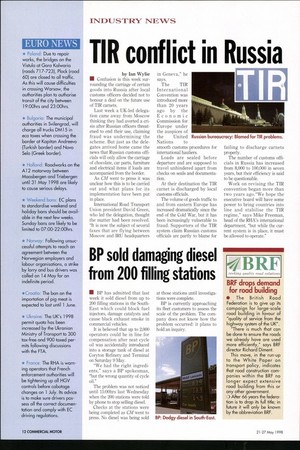TIR conflict in Russia by Ian Wylie • Confusion is
Page 14

If you've noticed an error in this article please click here to report it so we can fix it.
this week surrounding the carriage of certain goods into Russia after local customs officers decided not to honour a deal on the future use of TIR carnets.
Last week a UK-led delegation came away from Moscow thinking they had averted a crisis after Russian officers threatened to end their use, claiming fraud was undermining the scheme. But just as the delegates arrived home came the news that Russian customs officials will only allow the carriage of chocolate, car parts, furniture and electrical items if loads are accompanied from the border.
As CM went to press it was unclear how this is to be carried out and what plans for its implementation have been put in place.
International Road Transport Union president David Green, who led the delegation, thought the matter had been resolved. "It is now the subject of several faxes that are flying between Moscow and IRU headquarters in Geneva," he says.
The TIR International Convention was introduced more than 20 years ago by the Economic Commission for Europe under the auspices of the United Nations to smooth customs procedures for international hauliers.
Loads are sealed before departure and are supposed to travel unhindered apart from checks on seals and documentation.
At their destination the TIR carnet is discharged by local customs officials.
The volume of goods traffic to and from eastern Europe has increased dramatically since the end of the Cold War, but it has been increasingly vulnerable to fraud. Supporters of the TIR system claim Russian customs officials are partly to blame for failing to discharge carnets properly.
The number of customs officials in Russia has increased from 8,000 to 100,000 in seven years, but their efficiency is said to be questionable.
Work on revising the TIR convention began more than two years ago."We hope the executive board will have some power to bring countries into line and stabilise the TIR regime," says Mike Freeman, head of the RHA's international department, "but while the current system is in place, it must be allowed to operate."






















































































































